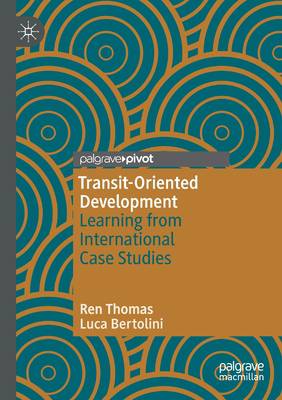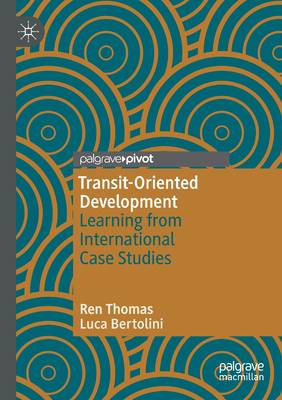
Bedankt voor het vertrouwen het afgelopen jaar! Om jou te bedanken bieden we GRATIS verzending (in België) aan op alles gedurende de hele maand januari.
- Afhalen na 1 uur in een winkel met voorraad
- In januari gratis thuislevering in België
- Ruim aanbod met 7 miljoen producten
Bedankt voor het vertrouwen het afgelopen jaar! Om jou te bedanken bieden we GRATIS verzending (in België) aan op alles gedurende de hele maand januari.
- Afhalen na 1 uur in een winkel met voorraad
- In januari gratis thuislevering in België
- Ruim aanbod met 7 miljoen producten
Zoeken
Transit-Oriented Development
Learning from International Case Studies
Ren Thomas, Luca Bertolini
Paperback | Engels
€ 99,45
+ 198 punten
Uitvoering
Omschrijving
This book uses international case studies to present insights on the policies, actors, and institutions that are critical to successful transit-oriented development (TOD). TOD has many potential benefits for cities and regions, and is considered a critical element in reshaping sprawling car-dependent urban regions into denser regions built around transit corridors. However, it is not a magic bullet solution for metropolitan transportation problems: challenges persist, such as displacement of local residents and regulatory barriers. How has TOD been successfully implemented? How can we integrate the positive aspects of TOD while minimizing its negative impacts?
This book presents a study conducted at the University of Amsterdam, exploring 11 international case studies, including a meta-analysis, rough set analysis and policy transfer workshops. The authors discuss the findings and present solutions to persistent challenges to transit-oriented development. Additional literature on eTOD (equitable TOD) strategies, as a fundamental component of planning for regional transportation, shows that these approaches can result in more collaborative processes, community-led development that minimizes the negative impacts of transportation infrastructure. As our Dutch colleagues stated, TOD can be considered a policy concept that can be used as a story to unite people.
This book presents a study conducted at the University of Amsterdam, exploring 11 international case studies, including a meta-analysis, rough set analysis and policy transfer workshops. The authors discuss the findings and present solutions to persistent challenges to transit-oriented development. Additional literature on eTOD (equitable TOD) strategies, as a fundamental component of planning for regional transportation, shows that these approaches can result in more collaborative processes, community-led development that minimizes the negative impacts of transportation infrastructure. As our Dutch colleagues stated, TOD can be considered a policy concept that can be used as a story to unite people.
Specificaties
Betrokkenen
- Auteur(s):
- Uitgeverij:
Inhoud
- Aantal bladzijden:
- 102
- Taal:
- Engels
Eigenschappen
- Productcode (EAN):
- 9783030484729
- Verschijningsdatum:
- 1/09/2021
- Uitvoering:
- Paperback
- Formaat:
- Trade paperback (VS)
- Afmetingen:
- 148 mm x 210 mm
- Gewicht:
- 145 g

Alleen bij Standaard Boekhandel
+ 198 punten op je klantenkaart van Standaard Boekhandel
Beoordelingen
We publiceren alleen reviews die voldoen aan de voorwaarden voor reviews. Bekijk onze voorwaarden voor reviews.









